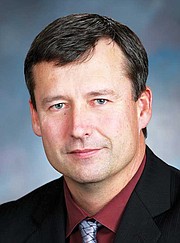Rail projects are key to our economic future
GUEST EDITORIAL
We and other members of the state's Legislative Rail Caucus recently toured the area's rail system and came away with a clear understanding of its important role in supporting and growing our rural economy. The Rail Caucus is a statewide, bicameral and bipartisan group that is dedicated to improving rail transportation in the state of Washington in partnership with other Northwest states. The goal of the Caucus is to identify and discuss solutions for sustaining and improving rail, which is critical to our transportation system.
The Rail Caucus recently visited the Port of Quincy Intermodal Terminal, the Port of Moses Lake's industrial complex, the Wheeler Road industrial corridor, and the growing Port of Warden industrial area - where Pacific Coast Canola has just received its first 50-car unit train.
In each community, its employers and producers depend on their current service to reach markets, as well as provide competitive prices for various supplies. In addition, there is consensus that maintaining and increasing rail service and capacity is the infrastructure priority for sustaining growth in Grant County.
A few interesting facts from the Grant County Economic Development Council provide insight into local rail's importance. In Warden, 560 local jobs are "rail dependent" - or 37 percent of total employment in the zip code. In Moses Lake, businesses that currently use rail, or say they need rail to grow, employ 2,913 people - about 20 percent of total employment and including many of the most dependable employers. And in Quincy, the growth of the Cold Train Express Intermodal Service, transporting central Washington produce and refrigerated agricultural products back east, has led directly to more than 100 new jobs in cold storage, warehousing, short-haul trucking and trans-loading. This does not include the new jobs with local producers and shippers that can now more cost-effectively compete in eastern markets. These jobs span the agriculture, food processing and industrial sectors.
There are many rail infrastructure needs in Grant County to expand economic success. Quincy has become a major inland intermodal distribution hub for Washington state fresh produce - including apples, potatoes, pears, onions, cherries and carrots. To accommodate the rapid growth of perishable agriculture commodities being shipped eastbound from central Washington, via the Port of Quincy Intermodal Terminal, the surface area of the terminal needs to be expanded and more siding track needs to be added.
In Moses Lake, a wide range of businesses utilize rail - from REC to Simplot, National Frozen Foods, D&L Foundry and others. In addition, Genie, BMW/SGL, Moses Lake Industries and others are saying their businesses will continue to expand if rail service is improved. These businesses need the Port of Moses Lake to build a new, more direct rail segment from Wheeler to the Grant County International Airport (GCIA).
Finally, Warden has seen a great deal of economic development recently - including a new canola oil production facility (Pacific Coast Canola), additional fresh produce packing and frozen and dehydrated food processing, and the associated warehousing for these products. Consequently, the Port of Warden's rail infrastructure is near capacity. More rail storage track is needed to allow for the efficient loading and unloading of rail cars and movement of trains on the Columbia Basin Rail Line - to and from Warden.
As many areas of our state call for expanded highways, central Washington also needs its road system to be maintained and improved - including the completion of the Snoqualmie Pass Project. However, it's apparent that one of our greatest needs is expanded rail infrastructure and service to support job growth and economic development. Unfortunately, our state's support of freight rail has been disappointing.
However, recent success in Grant County can be found in Royal City, where the Royal Slope Railroad, a 26-mile line from Royal City to Othello, was recently rehabilitated for operation. The railroad had been abandoned since 1993. Businesses in Royal City indicated this was critical to continuing their business in the area. Having rail service now will allow local businesses to compete with others since fuel rates are so high and rail is a more efficient way to ship goods.
After our recent tour of Grant County and its major employment hubs, we know that freight rail is a key part of this area's past and future. We feel strongly that freight rail must be recognized as a priority in our state's future transportation investment strategy.
The purpose of the state's Legislative Rail Caucus is to advance the understanding, communication, partnership and networking opportunities for rail in Washington state by working in conjunction with the state Department of Transportation, local governments and ports, Amtrak, freight railroads, rail suppliers, shippers, and more. It was fitting that Rail Caucus' first tour was of freight rail infrastructure in Grant County.
Reps. Judy Warnick and Matt Manweller represent the 13th District, which includes Kittitas, most of Grant, part of Yakima and Lincoln counties.
Rep. Luis Moscoso represents the 1st Legislative District, which includes part of northern King and southern Snohomish counties. He serves as the vice-chair of the House Transportation Committee.





